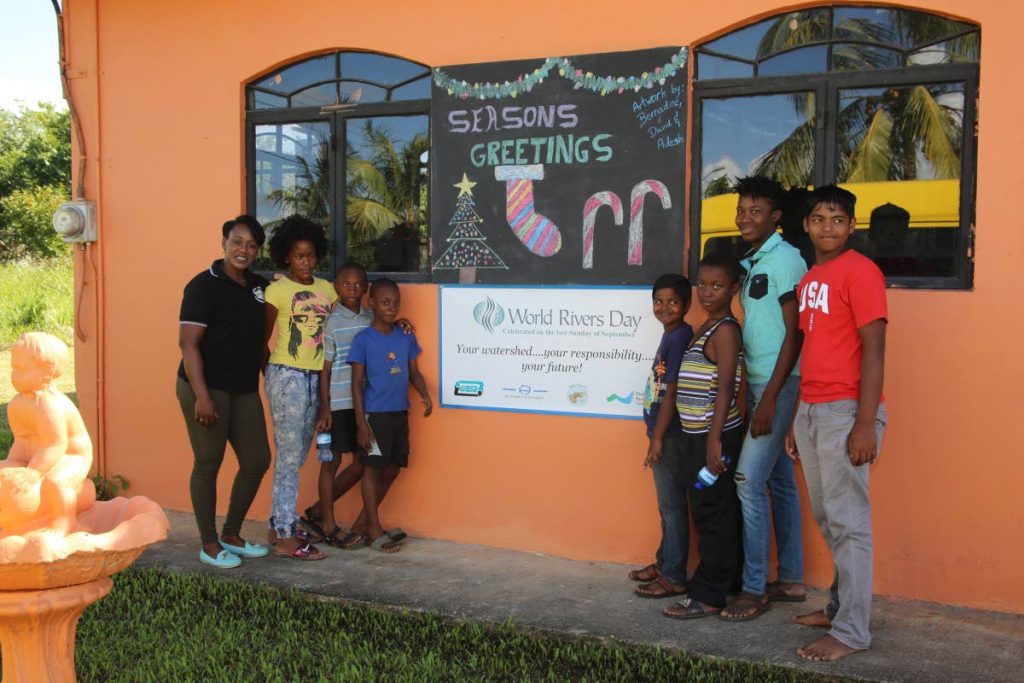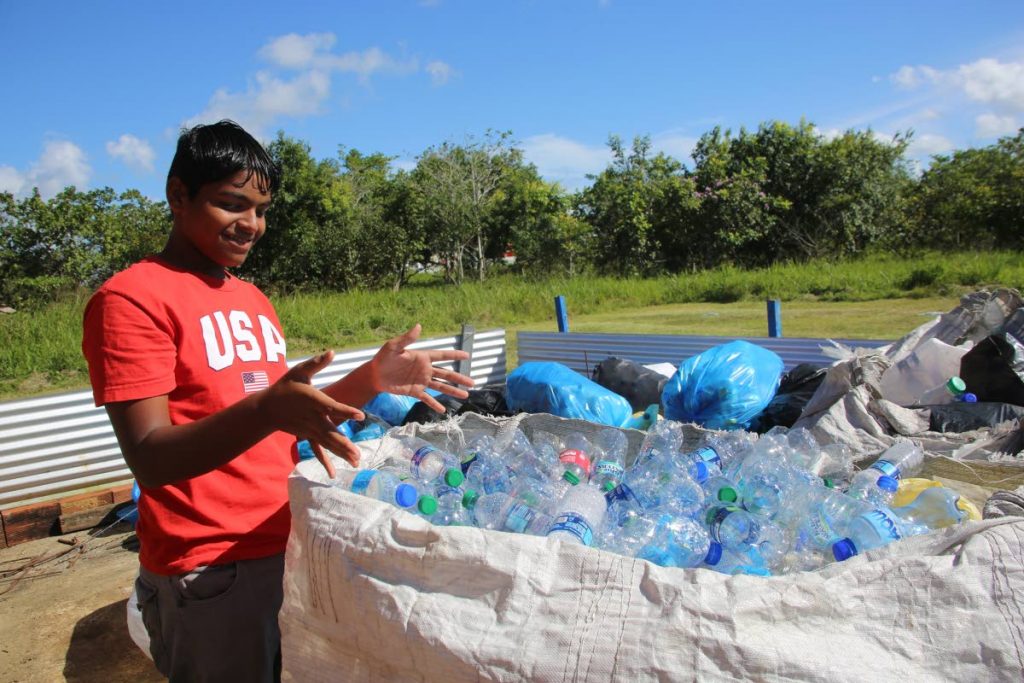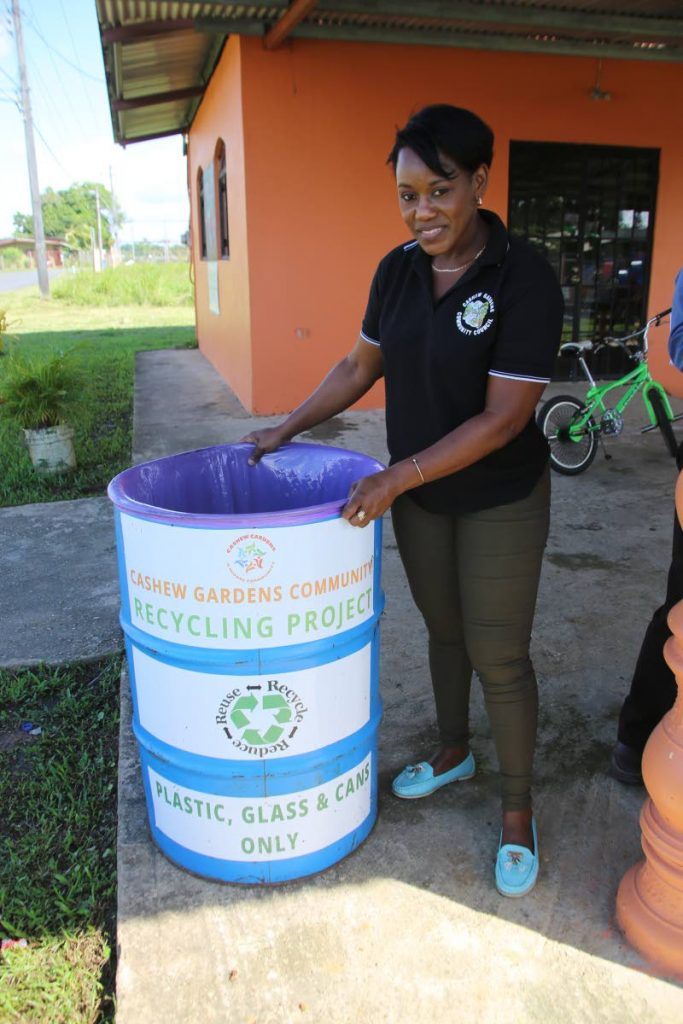Cashew Gardens, a recycling community

When the community group in Cashew Gardens, Chaguanas saw how much solid waste there was in the Caparo River, a major water source, they decided to start a recycling programme without any money but with determination and a group of energetic children. And within a year the level of waste they collected was cut in half.
Sunday Newsday chatted with president of the Cashew Gardens Community Council Roslyn George during a visit to their community centre last week.
She recalled in 2015 the council partnered with the Water and Sewerage Authority (WASA) to do water quality testing in the nearby Caparo River. The children from the council were trained in water testing and from 2015 to 2016 tested the water and sent samples to WASA.
George said they identified how polluted the water in the area was and found a lot of solid waste pollution, mainly plastics and some religious waste, with people putting items in plastic bags and then throwing it into the water.
The council decided to start a recycling programme to educate people about proper waste disposal. She said adults are usually set in their ways and it is difficult to break their habits, so from the inception of the programme they got the children on board. George said they already had a homework centre so the children were already engaged on a daily basis.
They met project leader of WASA’s Adopt-A-River programme Dr Sharda Mahabir, an initiative which “aims to bring awareness to local water pollution issues and to facilitate the participation of stakeholders towards reducing many of the challenges negatively impacting the country’s watershed and water resources”. The council also had a general community meeting where pitched the idea of the recycling programme.
George said the council made contact with Carib Glass who were happy to receive the glass they collected. George said Carib officials told her they get back less than two per cent of the glass and have to import most of the material to make new glass. Carib Glass also donated eight steel drums and the council labelled them. George said almost immediately people started putting recyclables into the bins, specifically plastic, glass and cans.

They also made contact with Recycling Waste and Logistics which sent them purple bags to collect recyclables. George explained the colour was to remind people to recycle and the bags were not for regular waste.
The children involved would jump on their bikes and go house to house to distribute the purple bags.
George said critical to the project was the collection of data and for the first three months they counted every plastic bottle and checked every brand. For that period they collected about 30,000 plastic bottles and sent them to the Solid Waste Management Company (SWMCOL) for recycling.
She said the question was when they collect all the material what were they going to do with it? They met with Dale Cozier, head of the Environmental Management Authority’s iCARE recycling programme, and he told them if they rolled it out in the community and it is successful, iCARE will support by sending transportation to move the materials from Cashew Gardens to SWMCOL. They have had this partnership since the project started in January.
The council also recently began a partnership with Recycling in Motion and the officials were very happy to received the recyclables. George said whichever body was available would come and collect the items. They had absolutely no money at the start and she would use her car to collect items and the children would use their bikes. She said the programme helps to keep the children together and away from drugs and gangs.
George pointed out that council secretary Bernadine Parris, 20, studies at MIC and collects plastics from her school.
“It is catching on and getting contagious,” she said.
Parris said by joining the programme she has become more active in the community and has good interaction with the children and helps to keep them off the streets.
“It gives a good mindset with them helping people instead of gangs and bullying.”
They have 20 children in the recycling programme with the youngest at age eight. Adesh Channan, 14, said his favourite part is riding his bike and taking up the bags.
Julia George, 11 and the council president’s daughter, said the project is fun and she likes being with her friends and getting to ride her bike.
“It is also fun getting to recycle and keep the environment clean.”
The children were also provided with reusable bottles which they can refill and take to school instead of buying water bottles.
At Easter, they had a camp and devoted one day to recycling and two representatives from Adopt-a-River taught the children about the water cycle. Two weeks ago, the council received an award from Adopt-a-River at Hilton Trinidad for their water quality testing, clean-up activities and launching the recycling programme.
George said every month they continue to test the water and though they have not seen a difference in the quality they have noticed a significant reduction in the solid waste. Last year, when they cleaned the river they picked up more than 30 bags of trash but this year they only picked up 15. George predicted next year they will see even less solid waste in the river.
She said over the months the volumes of recyclables have been increasing which shows that more and more households have been participating. They may are a little behind in updating the data on their collection but qualitatively, George noted a significant increase every month which shows more and more households have been participating.

The council averages about 16 bags of material per month. George joked that she should contact the Health Ministry because of the vast number of soft drink bottles they receive. In terms of plastics, they also get water bottles and a few oil bottles. They also receive a few cans and a lot of glass and have so far sent two tonnes to Carib Glass from which they receive a small stipend.
George said Cashew Gardens is not the only community impacted by the Caparo River and the council has held meetings with neighbouring communities. She said because the council is a close knit group and the children are very involved, they could pull off the project but it would be challenging for other communities to start a programme if they do not have that structure. George said while the communities were looking at setting up their own programmes in the interim they were bringing their recyclables to Cashew Gardens.
The council met with the Palmiste Village Council and the Maloney Gardens Council about starting their own projects. They also began an outreach attending the EMA environmental fair last year and the Anglican Church Green Fair. They have also had meetings with the Couva/Tabaquite/Talparo Regional Corporation which is one of their biggest supporters. George said their recent discussions have been about getting other communities involved in recycling and in the new year they should start all these activities. She reported Adopt-a-River will be heading to schools and the council has been engaged to assist them to show how their model works.
“We are willing to help anybody. Because we see the benefit of it. Trash is a huge problem in Trinidad and Tobago. Everybody need to get involved and do their part.”
George explained Cashew Gardens was a Land Settlement Agency project which was started in 2000 as an incremental development and land owners worked together to build their homes. She said residents were able to come together and build the community and homework centres funded by short crops sold from their community garden.
“We work hard. We achieve. This is our community. We built it the way we want it.”

Comments
"Cashew Gardens, a recycling community"